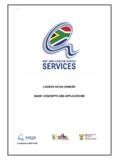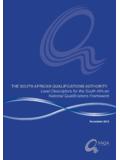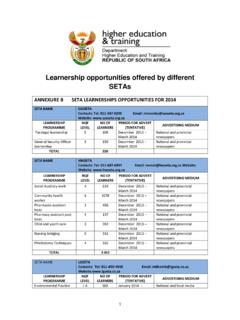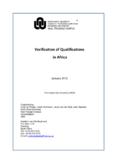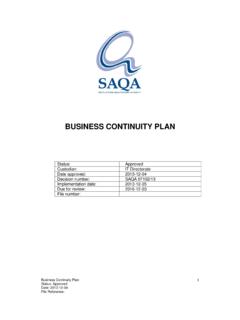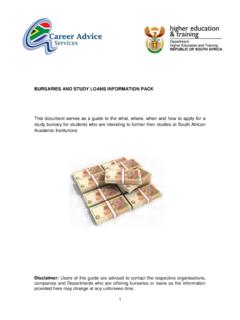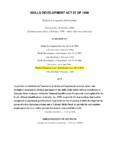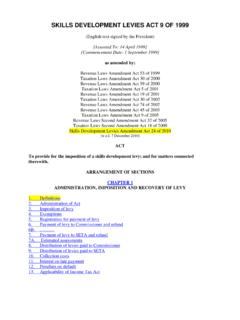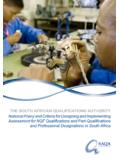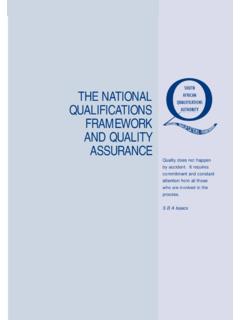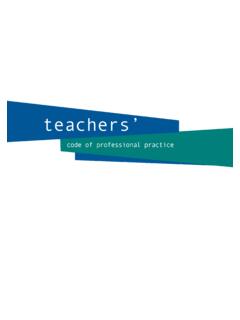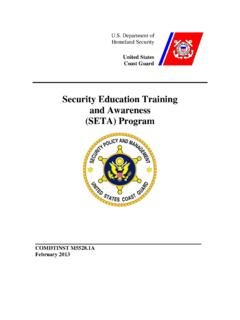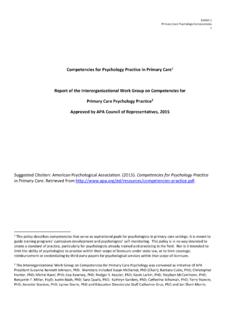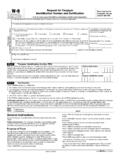Transcription of Criteria and Guidelines for the Implementation of the ...
1 GUIDELINE DOCUMENTC riteria and Guidelines for the Implementationof the Recognitionof Prior LearningRecognition of Prior Learning inSouth Africa must build on thecommitment of all role players toremove the barriers to learningand develop a visible, usableand credible system as aneffective and creative vehicle forlifelong refer any queries in writing to:The Executive OfficerSAQAA ttention: The Director; Quality Assurance and DevelopmentRE: Criteria and Guidelines for the Implementation of theRecognition of Prior Learning Postnet Suite 248 Private Bag X06 WATERKLOOF0145 PretoriaSOUTH AFRICATel: (012) 431 5131 Fax: (012) 431 5145e-mail: date: June 2004 ISBN: 0-9584572-2-0 CopyrightAll rights reserved.
2 No part of this publication may be reproduced, stored in a retrievalsystem, or transmitted in any form or by any means, electronic, mechanical, photo-copying, recording, or otherwise, without prior written permission of the South AfricanQualifications Authority (SAQA).Funded by the European Union under the EuropeanProgramme for Reconstructionand DevelopmentThe views expressed in this documentare not necessarily those of the and Guidelinesfor the Implementation of the Recognition ofPrior LearningTHE SOUTH AFRICAN QUALIFICATIONS AUTHORITYT able of ContentsAcronyms used in this document4 Preface5 Executive summary7 Structure of the document8 Chapter 1:Making a start.
3 An audit of current Access and Current Administrative Funding and the sources of Costing and comparative Curriculum Regional collaboration/inter-institutional Additional barriers to RPL implementation21 Summary23 Chapter 2: Planning: The development of sector-specific/context-specific Policies and procedures: An enabling Articulation Resources36 Summary38 Chapter 3: Getting ready: The capacity building of resources and Training of Assessor and moderator guidelines47 Summary52 Chapter 4:The tools: Design and moderation of Methods and processes of A working RPL and curriculum Moderation and review68 Summary69 Chapter 5:Review and evaluation.
4 Quality management Quality management of RPL International Core Criteria for quality management systems76 Summary77 Conclusion78 List of sources79 Acronyms used in this documentAPLA ssessment of Prior LearningCETAC onstruction Sector education and Training AuthorityCHEC ouncil on Higher EducationCTPC ommittee of Technikon PrincipalsDoEDepartment of EducationDoLDepartment of LabourETDE ducation, Training and DevelopmentETQAE ducation and Training Quality Assurance BodyFETF urther education and TrainingFETCF urther education and Training CertificateFSHFETTFree State Higher and Further education and Training TrustNAP(draft)
5 A New Academic Policy for Programmes and Qualifications inHigher EducationNGONon-Governmental OrganizationNLRDN ational Learners Records DatabaseNQFN ational Qualifications FrameworkNSBN ational Standards BodyNSFN ational Skills FundPLARP rior Learning Assessment and RecognitionRPLR ecognition of Prior LearningSAQAS outh African Qualifications AuthoritySERVICESS ervices Sector education and Training AuthoritySETAS ector education and Training AuthoritySGBS tandards Generating BodySMMES mall-, Medium- and Micro EnterpriseSSPS ector Skills PlanUNISAU niversity of South AfricaDIRECTORATE: QUALITYASSURANCE ANDDEVELOPMENT4 Criteria and Guidelines for the Implementation of the Recognition of Prior LearningPrefaceTheCriteria and Guidelines for the Implementation of Recognition of Prior Learningwasdistributed for public comment from 16 April to 30 June 2003.
6 Public comment receivedwas generally of a positive nature and appreciative of the direction proposed in the , it should be acknowledged that although thorough descriptions of possible inhibitorsto the Implementation of Recognition of Prior Learning (RPL) were given in many cases, clearways of addressing these inhibitors were not. Two issues were highlighted in particular: regulatory and statutory requirements are still in place which may slow down initiatives toimplement RPL, such as the Matriculation with endorsement as a prerequisite for entryto higher education , the award of qualifications, and the 50% residency clause.
7 And a lack of a clear subsidy structure for RPL in terms of public institutions, but also withregard to possible funding sources for private providers and workplaces wanting to initiateRPL within their issues clearly require further investigation. A decision was therefore taken that the current Guidelines would become a living document to allow for continuous engagement with the aspects impacting on the Implementation of RPL,while already giving some guidance in other areas. This will allow for critical contextual issues to be highlighted and incorporated as these emergefrom practice.
8 In addition, targeted responses will be elicited from a range of stakeholders, includingworkplaces, professional bodies, education and Training Quality Assurance bodies (ETQAs)and other umbrella bodies. RPL is a new concept in South Africa, particularly in terms of a systemic approach to itsimplementation. It is therefore critical that a systemic approach is developed, an approach thatwill allow for institutional autonomy and contextual practices and, at the same time, an overallagreed-upon approach that protects the integrity of qualifications and the award of credits.
9 Webelieve that by keeping this document open-ended and non-prescriptive, it will support thedevelopment of systems and processes that ultimately enhance the Implementation of and Guidelines for the Implementation of the Recognition of Prior Learning5It is our view that such a system can only be built through critical engagement with RPLpractice and eventual consensus on the application of RPL across the system. This living document hopes to contribute to such : QUALITYASSURANCE ANDDEVELOPMENT6 Criteria and Guidelines for the Implementation of the Recognition of Prior LearningRecognition of Prior Learning in South Africa has, unlike similar initiatives in other countries, a veryspecific agenda.
10 RPL is meant to support transformation of the education and training system of calls for an approach to the development of RPL policy and practices that explicitlyaddresses the visible and invisible barriers to learning and assessment. Such an approach mustgenerate the commitment of all role players to remove these barriers and to build a visible, usableand credible system as an effective and creative vehicle for lifelong learning. It is important that con-sensus be generated around the Criteria and support systems within which the integrity and qualityof all assessments will be stated in the SAQA RPL policy (2002.)
